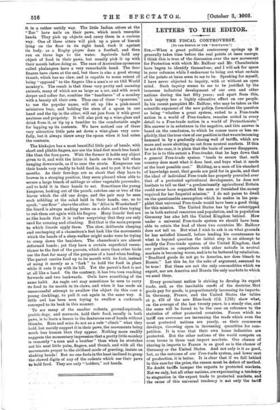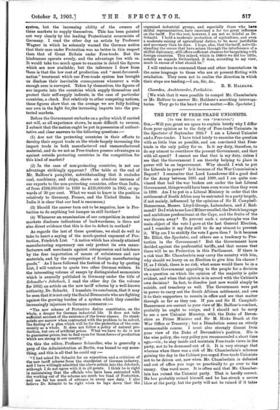LETTERS TO , THE EDITOR.
THE FISCAL CONTROVERSY.
[TO Tea EDITOR OF FRI " SPECTATOR."f SIR,—When a great political controversy springs up it generally takes time before the real points at issue emerge. I think this is true of the discussion over the new movement for Protection with which Mr. Balfour and Mr. Chamberlain have begun to identify themselves; and I will ask for space in your columns while I endeavour to bring out what certain of the points at issue seem to me to be. Speaking for myself, I have never objected to inquiry, with or without an open mind. Such inquiry seems to me to be justified by the immense industrial development of our own and other nations during the last fifty years; and apart from this, such inquiry has a -highly educative effect on our people. In his recent pamphlet Mr. Balfour, Who may be taken as the scientific exponent of the new policy, formulates the question as being "whether a great system, suited to a Free-trade nation in a world of Free-traders, remains suited in every detail to a Free-trade nation in a world of Protectionists." His answer is in substance in the negative, and this answer is based on the conclusion, to which he comes more or less ex- plicitly, that the true view of our position is that we are becoming hemmed in by a gradually closing wall of tariffs, which are more and more shutting us out from neutral markets. If this be not the case, it is plain that the basis of answer disappears. For he is to this extent a Free-trader, that he lays down that a general Free-trade system "tends to secure that, eaeh country does most what it does best, and buys what it needs at the least possible cost." Holding, as a man of his standard of knowledge must, that goods are paid for in goods, and that the ideal of individual Free-trade has properly prevailed over that of a protected agricultural development, he does not hesitate to tell us that "a predominantly, agricultural Britain could never have supported the men or furnished the,money required for her Imperial mission." I do not pause to dwell on the questionable assumption which he makes in his pam- phlet that universal Free-trade would have been a good thing for this mission. The United States has by far outstripped us in both natural resources and population, and in population Germany has also left the United Kingdom behind. How under a universal Free-trade system we should have been able to retain the lead of these two countries Mr. Balfour does not tell us. But what I wish to ask is on what grounds be has satisfied himself, before lending his countenance to what is beyond question the initial step in an attempt-to modify the Free-trade system of the United Kingdom, that our position as competitors with other nations in neutral markets is becoming worse, and is to be bettered by retaliation. "Bradford goods do not go to America, nor does- bleach' to Russia." Let this be, for the sake of argument, assumed -to be true ! But these are not the only commodities which we export, nor are America and Russia the only markets to which we send them.
Every prominent nation is striving to develop its export trade, and, as the inevitable rem& of the doctrine, that goods pay for goods, is proportionately increasing its imports. In Germany, France, and the United States the tables at p. 476 of the new Blue-book (Cd. 1,761) show what, on the average of the last twenty years, is a steady rise, and the same will be found to be the case on reference to the statistics of other protected countries. Forces whidh no tariff can overcome are increasing the trade which even- the most protected nations are yearly, as their commerce develops, throwing Open in increasing quantities for com- petition. It is true that their own home industries are protected. But the other nations of the world conipete on even terms in these vast import markets. Our chance of sharing in imports to France is as good as is the chance of Germany or the United States. And not only is it as good, but, as the outcome of our Free-trade system, and lower cost of production, it is better. It is clear that if we fall= behind in this race for the prize, the reason must be defect of method. No doubt tariffs hamper the exports to protected markets. Not we only, but all other nations, are experiencing a tendency to stagnation in the export trade to protected markets, and the cause of this universal tendency is'not only the tariff system, but the increasing ability of the owners of these markets to supply themselves. This has been pointed out very clearly by the leading Protectionist economists of Germany. I read the other day an article by Professor Wagner in which he solemnly warned the German nation that their case under Protection was no better in this respect than that of Great Britain under Free-trade. But the hindrances operate evenly, and the advantage lies with us.
It would take too much space to examine in detail the figures which are now available; but the inference I draw from them is that the low cost of production and " most-favoured- nation " treatment which our Free-trade system has brought us disclose their inevitable consequences whenever a wide enough area is surveyed. Taken by themselves, the figures of our imports into the countries which supply themselves and protect their self-supply indicate, in the case of particular
countries, a check. But relatively to other competing nations, these figures show that on the average we are fully holding our own in the fight for„the increasing imports into the pro- tected markets.
Before the Government embarks on a policy which if carried out will, as all experience shows, be most difficult to reverse, I submit that the nation ought be put in possession of authori- tative and clear answers to the following questions :— (1) Are not the protecting countries in their efforts to develop their export trade on the whole largely increasing the import trade in both manufactured and unmanufactured material, and do we not as Free-traders possess advantages as against outside protecting countries in the competition for this kind of market? • (2) In the case of non-protecting countries, is not our advantage strikingly apparent ? (The table at the end of Mr. Balfour's pamphlet, notwithstanding that it excludes coal, machinery, and ships, shows an absolute increase of our exports to the non-protecting coimtries, other than India, of from £106,000,000 in 1880 to £139,000,000 in 1902, or up- wards of 30 per cent. What we want to know is the position relatively to Germany, France, and the United States. In India it is clear that our lead is enormous.) (3) Should the answer turn out to be negative, how is Pro- tection to do anything but hamper us still further?
(4) Whenever an examination of our competition in neutral markets discloses indications of backwardness, is there not also direct evidence that this is due to defect in method?
As regards the last of these questions, we shall do well to take to heart a saying of the much-quoted exponent of Pro- tection, Friedrich List. "A nation which has already attained manufacturing supremacy can only protect its own manu- facturers anti merchants against retrogression and -indolence by-the free importation of means of subsistence and raw materials, and by the competition of foreign manufacturing goods." As I have followed the fashion of to-day by quoting List, I will venture to quote two other German writers. In the interesting volume of essays by distinguished economists which is annually published in Germany under the title of Schnoller's Jahrbuch, I read the other day (in the volume for 1902) an article on the new tariff scheme by a well-known authority, Dr. Schacht. I translate its conclusion, that it may be seen that it is not only the Social Democrats who are fighting against the growing burden of a system which they consider increasingly injurious to German commerce :— " The new scheme of Protective duties constitutes, on the whole, a danger for German industrial life. It does not take sufficient account of the existence of the lower classes. Its stand- points are narrow when contrasted with the problem to be solved, the finding of a plan which will be for the protection of the com- munity as a whole. It does not follow a policy of natural pro- duction, but one of artificial prices. What we have to do is not to guarantee prices, but to find room for those forces of production which are strong in our country."
On this the editor, Professor Schsnoller, who is generally a prop of the Administration at Berlin, was bound to say some- thing, and this is all that he could say
• "I had asked Dr. Schacht for an exposition and a criticism of the lie* tariff scheme from the standpoint of 'German industry, arid. I have willingly admitted the above article into the Jahrbuch, although I. do not agree with it in all points. I think he is right in Maintaining that the officials who have been entrusted with the working out of the scheme are much too .fond of- Protection, -'and see far too much of advance in every new duty.- I • also :believe Dr. Schacht to he_ right when he lays down that the organised industrial groups, and especially those who have skilful representatives, have exercised a far too great influence On the tariff. For the rest, however, I am not so doleful as Dr. Schacht. I hold a moderate protection of agriculture, and even a moderate raising of agricultural duties, to be more justifiable and necessary than he does. I hope, also, that the tariff, notwith- standing the errors that have arisen through the interfersuice of a skilful diplomacy, still offers sufficient chances for bargaining with foreign countries. This indeed, which in 1890-9 we did too little, notably as regards Switzerland, it does, according to my view,
much in excess of what should be." .
I will venture to commend these and other lamentations in the same language to those who are at present flirting with retaliation. They seem not to realise the direction in which their steps are tending.—I am, Sir, &c.,
R. B. HILDANZ.
Cloanden, Auchterarder, Perthshire.
[We wish that it were possible to compel Mr. Chamberlain or Mr. Balfour to answer Mr. Haldane's searching interroga- tories. They go to the heart of the matter.—En. Spectator.]



























































 Previous page
Previous page